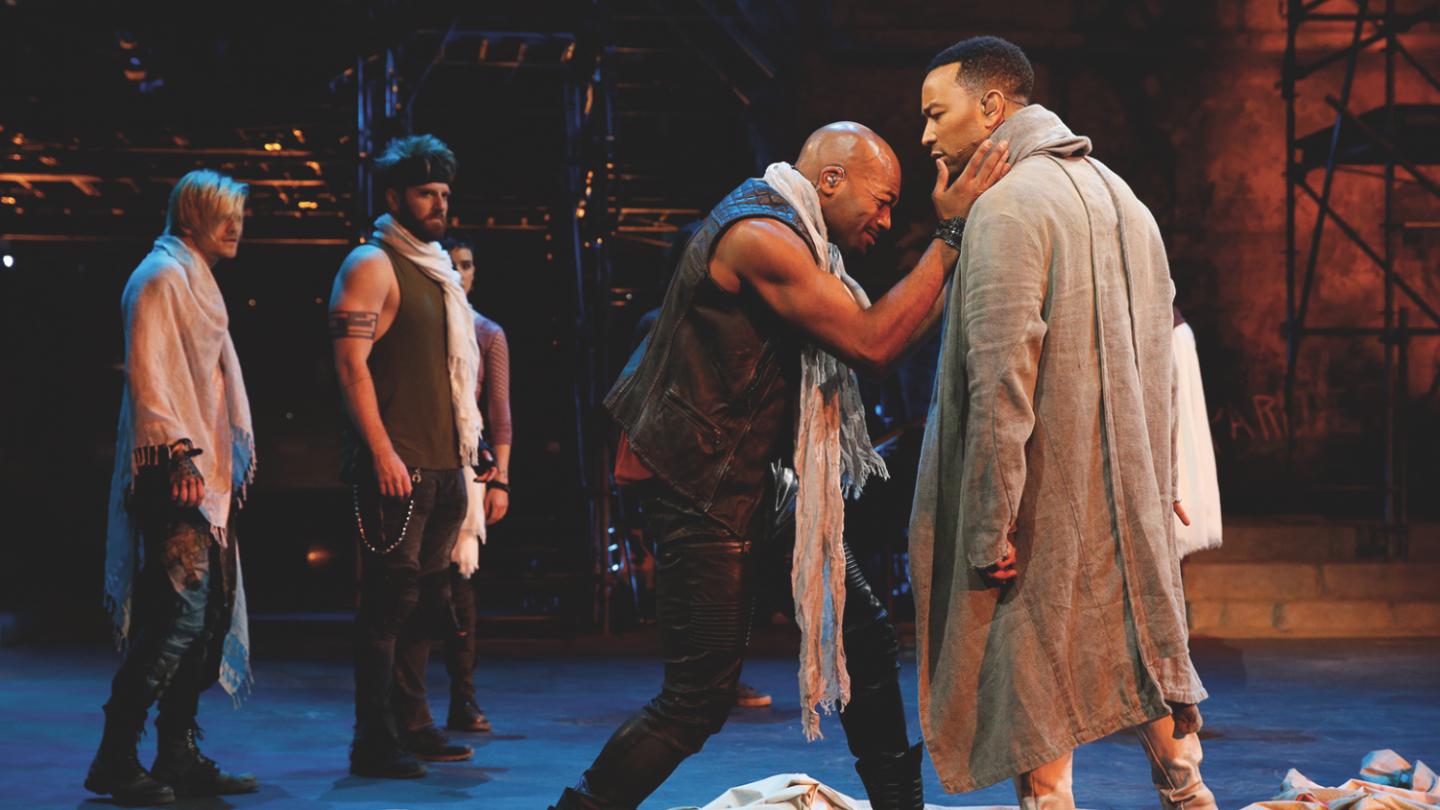It was 1978, and my younger sister and I sat cross-legged in front of my mother’s stereo, mesmerized by the green glow of the console and by the music coming out of the speakers on either side of us. We didn’t often use Mom’s big, expensive stereo, but this was a special treat for Holy Week — we were listening to the 1970 London cast recording of Jesus Christ Superstar.
I was enthralled as much by the distinctive, soaring vocals as I was by the drum beats and guitar riffs. At eight years old, I was still listening to Sesame Street albums, so this was my introduction to rock ’n’ roll. It was also my introduction to Jesus beyond the simple Sunday school stories. Dropped right into my formative years, Jesus Christ the Superstar made a lasting impression on me.
When I rediscovered the album on CD in my mid-20s, its dramatic retelling of the Jesus story hit me in a new way. Herod asking Jesus to walk across his swimming pool. Jesus’ agonized prayer in Gethsemane. Even the hint of romance between Jesus and Mary Magdalene when she sings, “I don’t know how to love him / What to do, how to move him / I’ve been changed, yes really changed.” Listening, I forgot to breathe. The emotions of the characters became my emotions: anger, disbelief, sadness. I thought about the story for hours, pondering the role each person plays, wondering why.
Now, listening to Jesus Christ Superstar is an annual Lenten tradition for me (I never listen to it outside of Lent). Over the years, as I’ve gained life experience and read more widely, I’ve deepened my understanding of the Christ story. I better understand the geopolitical motive for Jesus’ death, the complicated relationships between friends and followers, and the timeless and universal pattern of human behaviour that the gospel illustrates. But I continue to view this story through the lens of my favourite rock opera.
More on Broadview: Why I believe in a non-binary Jesus
Jesus Christ Superstar was born the same year I was: 1970. After collaborating on Joseph and the Amazing Technicolor Dreamcoat, lyricist Tim Rice and composer Andrew Lloyd Webber decided to tackle the story of the final days of Jesus of Nazareth from the viewpoint of Judas Iscariot — a controversial choice, since he’s traditionally portrayed as a villain. But when no one wanted to produce the work as a stage show, they instead created a 90-minute, two-record concept album and released it in September 1970.
And then, nothing. In a 2015 interview for Jesus Christ Superstar’s official YouTube channel, Lloyd Webber said the 1970 album initially came out in England to “resounding silence.”
“It was greeted with the idea that it would be caught in the crossfire of young people who thought it was uncool because of the subject matter and older people who thought it was disrespectful. Tim and I thought the album was dead,” Lloyd Webber told the interviewer. “Then, suddenly we got called to America, where it was number one.”
In fact, Jesus Christ Superstar beat out the Rolling Stones, Led Zeppelin and John Lennon for the biggest-selling album of 1971. It even received play in Rome, with Vatican Radio airing it in its entirety, a spokesperson describing the album as “a work of considerable importance.” After the recording caught on, Jesus Christ Superstar made its debut on Broadway later that same year. Its run included 700 shows and five Tony nominations (although it never won).
The show stirred controversy as well. Groups like the American Jewish Committee and B’nai B’rith’s Anti-Defamation League denounced the musical’s depiction of Jewish people as villainous. And some Christians, including evangelical leader Billy Graham, took offence to what they considered a blasphemous and sacrilegious depiction of Jesus.
But no critics have been able to keep Jesus Christ Superstar down. Rather than being “damned for all time,” to quote one of Judas’ songs, the rock opera has endured through many incarnations, each one a product of its era. Musically, Rice and Lloyd Webber created the kind of sprawling concept album that was all the rage in the early ’70s. Spiritually, they connected with a generation of young Christians for whom Jesus was a counter-cultural hippie icon.
“If you don’t like [that] era’s music and style, you’re never going to like Jesus Christ Superstar,” said Toronto-based film reviewer Sister Helena Burns in an interview with the Catholic Register last year.
In the 1973 movie version, Jesus was white and blond — a common misrepresentation — and Judas Iscariot was played by a Black singer. As Peter T. Chattaway recently wrote in Christianity Today, Judas’ “frustrations with Jesus and his increasingly spiritual mission seemed to echo the black community’s impatience with white Christianity and its lack of engagement with justice issues.”
In contrast, NBC’s 2018 live broadcast of the musical featured Jesus as a Black man (John Legend) and Herod played by shock rocker Alice Cooper. The live show was watched by over nine million people and hailed by critics, including one in Esquire magazine who wrote, “The rock opera has finally achieved the mass appeal its creators didn’t expect when they conceived of it five decades ago.”
And now, for its 50th anniversary, Jesus Christ Superstar is back for a tour that will take it to more than 30 cities across the United States. According to several reviews posted online, the current production has “determinedly tried to catch a little hip-hop fire” (Los Angeles Times) in a “hard-rocking, hipster-minded revival” (San Diego Union-Tribune).
A hipster Jesus Christ Superstar for the 21st century? Why not? No matter how the story is framed — as ’60s hippie culture or ’90s pop culture — the emotional power of the music continues to keep audiences enthralled, just like I was at the age of eight.
In the days leading up to Easter Sunday in 2018, as the media talked up the much-anticipated live TV production of Jesus Christ Superstar, I sat cross-legged on the floor of my upstairs hallway, painting the baseboards and listening to the only version I’ll ever need — the original recording. I heard Herod demand that Jesus prove himself, and I heard the crowd turn against Jesus and his friends deny him.
As a lay worship leader, I often proclaim that “the world needs more Jesus.” But I find myself wondering what would happen if a man showed up today preaching peace, love and understanding for the poor and the oppressed, the imprisoned and the abandoned.
I swiped white paint on a baseboard. Jesus Christ the Superstar in the 21st century? We still won’t know how to love him.
This essay was first published in Broadview’s April 2020 issue with the title “Rock opera lives on.”
Broadview is an award-winning progressive Christian magazine, featuring stories about spirituality, justice and ethical living. For more of our content, subscribe to the magazine today.


Comments
Gary says:
"But I find myself wondering what would happen if a man showed up today preaching peace, love and understanding for the poor and the oppressed, the imprisoned and the abandoned. " (Remember He loved and understood the rich and powerful as well - Matthew and Nicodemus)
I do as well, and the Church's of today, no doubt, would still crucify Him for His stand.
Mr Burns says:
Well Sara; IF you knew Him, not just about Him, you is no way you wouldn't love Him, with all your heart,soul,strength and mind!!!
Have you ever invited Him into your life?